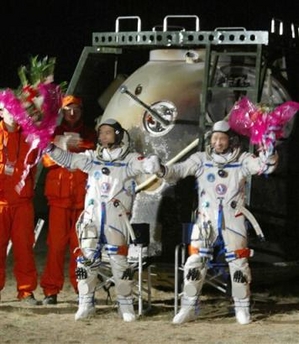|
China may recruit female astronauts
(AP)
Updated: 2005-10-17 20:49
China hopes to conduct a spacewalk in 2007 and might
recruit women into its next group of astronaut candidates, a senior space
program official said Monday following the safe completion of the nation's
second manned mission.

This photo released by China's Xinhua News
Agency shows Chinese astronauts Fei Junlong, left, and Nie Haisheng hold
flowers in front of the re-entry capsule of China's second manned
spacecraft, Shenzhou 6, after landing in Siziwang Banner County, north
China's Inner Mongolia Autonomous Region Monday, Oct. 17, 2005. The space
capsule carrying two Chinese astronauts landed by parachute in the
country's northern grasslands before dawn Monday following a five-day
mission meant to affirm China's status as an emerging space power.
Astronauts Fei and Nie were 'in good health' and 'feeling good' after
their Shenzhou 6 capsule touched down at 4:32 a.m. (2032 GMT) in the Inner
Mongolia region, Xinhua News Agency said.
[AP] |
The Shenzhou 6 flight ended the first stage of China's plan, which focused on
development of space vehicles, said Tang Xianming, director of the China Space
Engineering Office. The next stage focuses on developing ways for astronauts to
walk in space and the ability to rendezvous and dock with other spacecraft, he
said.
"Our estimate is that around 2007 we will be able to achieve extravehicular
activity by our astronauts and they will walk in space," he said at a news
conference.
Tang said he also expected to see female Chinese astronauts "in the
not-too-distant future."
"At present, we do not have women participants among our astronaut
candidates," he said. "But according to our development program and plans for
manned space engineering, for the next round of selections, we might consider
having some female astronauts."
The Shenzhou 6 capsule carrying astronauts Fei Junlong and Nie Haisheng
landed before dawn Monday by parachute in China's northern grasslands after a
five-day mission.
Crews rushed to the site in helicopters and off-road vehicles. State
television showed the astronauts climbing out of their kettle-shaped capsule
with the help of two technicians and clambering down a ladder in the darkness.
They smiled, waved to the cheering ground crew, accepted bouquets of flowers
and sat in metal chairs beside the capsule.
"I want to thank the people for their love and care. Thank you very much,"
Fei said.
The country's No. 2 leader, Wu Bangguo, who watched the landing from the
Beijing mission control center, declared the flight a success.
"This will further improve the country's international status and national
strength, and will help to mobilize its people to rally around the Communist
Party and work harder for the future of the country," Wu said in a brief speech
to technicians.
In a break with the military-linked space program's usual intense secrecy,
state media lavished coverage on this mission — a decision that paid off in an
outpouring of patriotic excitement.
"Today, every son of the Yellow Emperor feels very proud," said Shanghai
furniture salesman Zhang Jinhua, 34, referring to the legendary founder of the
Chinese nation.
Communist leaders hope that such pride will shore up their standing at a time
of public frustration at corruption, wrenching economic change and a growing gap
between rich and poor.
On Monday, state television showed technicians at the Beijing control center,
once a closely guarded secret, cheering when word came that the astronauts —
known in Chinese as yuhangyuan, or "travelers of the universe" — were safe.
After a snack of noodles, tea and chocolate, Fei and Nie were flown to
Beijing and welcomed as heroes.
On the tarmac in the Chinese capital, Defense Minister Cao Gangchuan saluted
them and other members of the astronaut corps embraced them, one with tears in
his eyes.
Fei and Nie, both former fighter pilots, rode in an open car in a parade
through a military facility.
Dressed in blue jumpsuits and white gloves, they waved to thousands of
cheering soldiers and groups of children as musicians beat Chinese drums and
cymbals. "Welcome the space heroes," said a banner hung along the route.
Shenzhou 6 flew 2 million miles in 115 hours and 32 minutes in space, the
official Xinhua News Agency said. The mission was far longer and more complex
than the 2003 flight, when astronaut Yang Liwei orbited for 21 1/2 hours.
The Shenzhou 6 mission demonstrates that "China has grasped the core
technology of manned space engineering and shows that China can independently
solve high-technology problems and has earned a seat in the upper echelons of
the world's science and technology fields," Tang said.
The Shenzhou 6 is a modified version of Russia's Soyuz capsule. China also
bought Russian technology for spacesuits, life-support systems and other
equipment. But space officials say all the items launched into orbit were
Chinese-made.
The government already has announced plans to land an unmanned probe on the
moon by 2010 and eventually send up an orbiting laboratory.
China said last year it would launch a moon-orbiting satellite in 2006. The
2-ton Chang'e satellite would orbit at least a year and record three-dimensional
images of the lunar surface.
The lunar program — named Chang'e after a legendary Chinese goddess who flew
to the moon — includes plans to land a vehicle by 2020 that would collect soil
samples and conduct other tests, possibly in preparation for a manned moon
base.
|